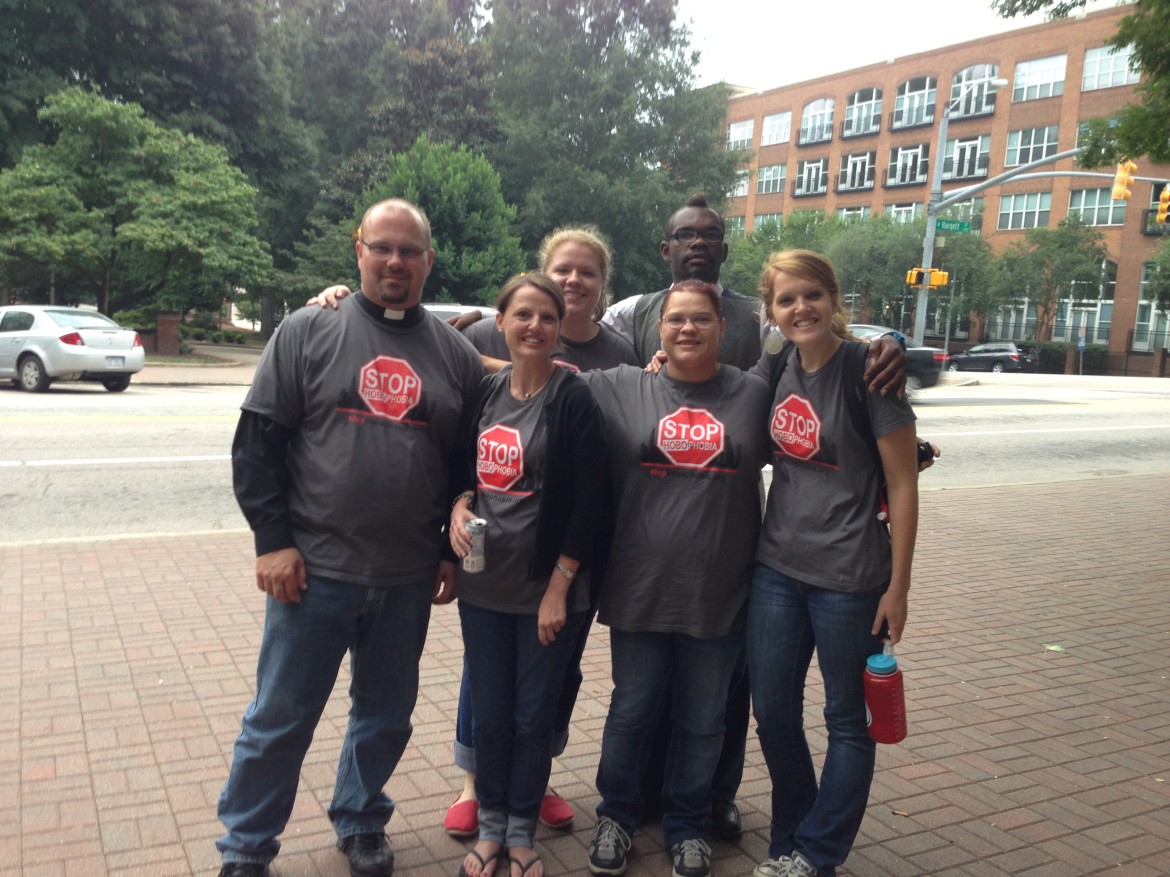Following a weekend media furor and well-attended discussion Wednesday, City Council members agreed on a temporary compromise, allowing organizations to distribute food to homeless and hungry people on Moore Square on weekends.
Under the temporary rules, organizations will have to get a free permit from the city. The current law prohibiting such food distribution will stay in place as Councilors work to figure out a permanent solution.
The compromise comes after a blog post by Love Wins Ministries spread on social media.
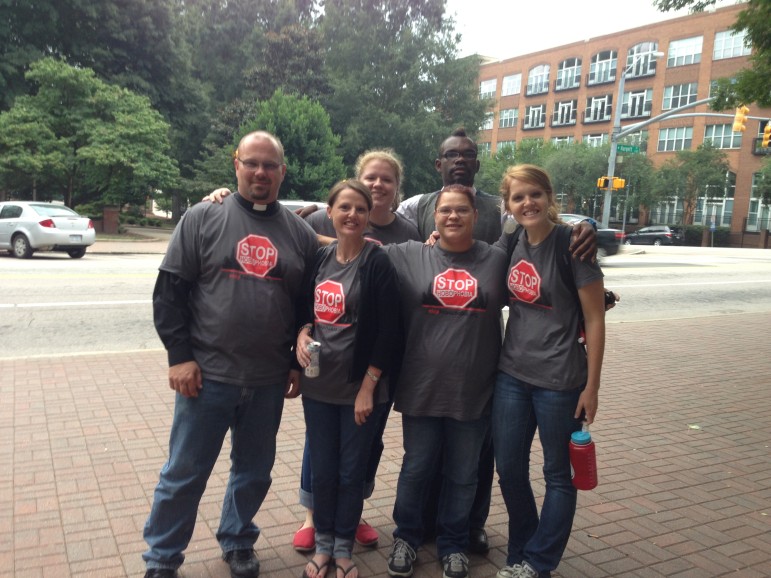
James Borden / Raleigh Public Record
Members of Love First ministries, standing outside City Hall Wednesday. Members include Hugh Hollowell, far left and Maggie Kane, far right.
The post “Feeding the Homeless Apparently Illegal in Raleigh, N.C.,” appeared Aug. 24 on the Love Wins Ministries web site. For years, the group has been feeding the homeless every weekend in Moore Square park downtown. The post detailed a run-in with city police, during which volunteers were threatened with arrest if they distributed a breakfast of biscuits and coffee to a large crowd of the less fortunate and homeless.
The ministry was told they were in violation of city ordinance 9-2022(b), put in place in 1999, which prevents the distribution of food in city parks without an $800 permit.
The city’s two soup kitchens are closed on the weekends, only one of which, Shepherd’s Table on Hillsborough Street, is located centrally to the downtown district.
The post rapidly exploded across social media, and within 24 hours had thrust the capitol city into an uncomfortable national spotlight.
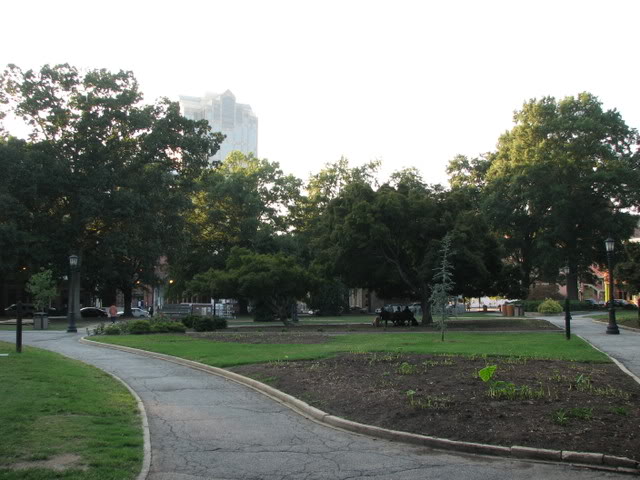
Moore Square. Photo by Leo Suarez.
The City Responds
The Raleigh City Council’s Law and Public Safety Committee traditionally meets on the second and fourth Tuesday of each month in a small conference room on the third floor of city hall.
The meeting scheduled for Tuesday, originally cancelled, then rescheduled, was eventually moved to Wednesday in the much-larger City Council chambers and was expanded to allow observation by Mayor Nancy McFarlane and City Councilors not part of the committee.
More than 200 people turned out for the afternoon meeting, largely due to the committee’s allowance for an extended period of public comment. During that time, dozens of city residents addressed the committee, expressing a mixture of gratitude, frustration, and an overwhelming desire for everyone in attendance to work towards finding a way to best help the city’s most needy.
Parks and Recreation Director Diane Saur said the city began collaborating with Wake Area Missions Ministries in September 2012 after a community meeting that identified managing groups feeding the homeless as a top priority for residents and business owners.
Saur said that the city’s Community Oriented Government group has been working to identify key places outside of Moore Square where organized distribution could happen.
In the meantime, the Raleigh Police Department was tasked with educating groups about the parks ordinance, as well as the ordinance that prohibits groups from congregating and blocking the sidewalk, which also requires a permit.
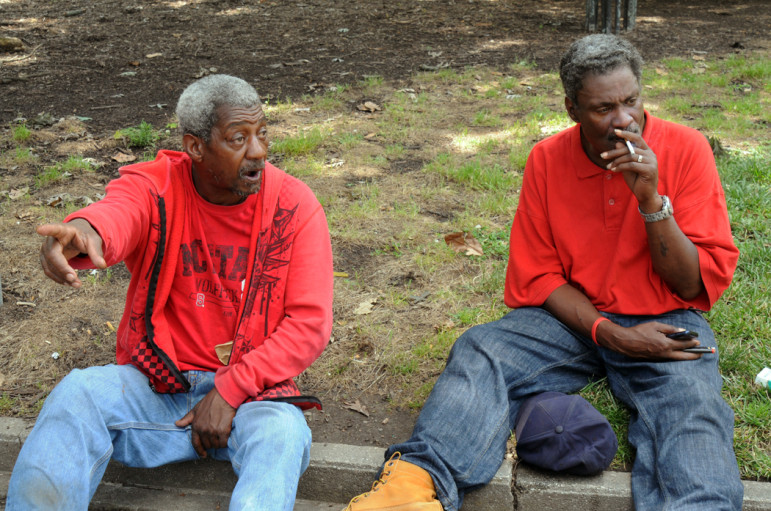
Karen Tam / Raleigh Public Record
Sitting on the grass in Moore Square, Larry Underwood, left, says he sleeps outdoors and Samuel L. Johnson, right, has a place to live on Avent Ferry Road.
Educational Outreach
In the meeting, Police Chief Cassandra Deck-Brown said the department has been working with the Love Wins ministry on a weekly basis about the issue.
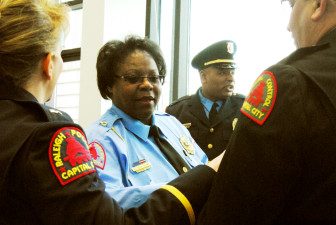
Karen Tam
Police Chief Cassandra Deck-Brown, on the day of her swearing-in ceremony.
“We clearly know that we can’t, nor do we desire, to arrest our way out of this,” she said.
Deck-Brown added that in a recent meeting, the ranking heads of several departments met to discuss the issue of distributing food in the park. Deck-Brown said that four high-ranking officers were responsible for going around to each of these groups and informing them of the ordinances on the books.
She said these officers began interacting with groups the weekend of Aug. 24 and 25.
She said that no citations were to be given or arrests to be made.
Helping Those in Need
Maggie Kane is the director of operations for Love Wins Ministries.
In an interview conducted Tuesday inside the ministry’s small, crowded offices on West Jones street, where the group provides everything from free laundry services to no-charge Wi-Fi for more than 80 people every Monday through Thursday, she explained that the organization had been handing out food on the weekends for years with no problems — until this past Saturday.
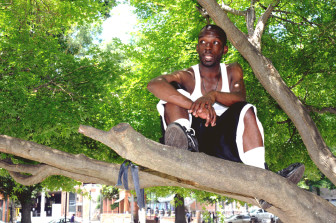
Karen Tam / Raleigh Public Record
Tony Smith from Georgia, stays cool up in a tree in Moore Square.
“We had seen the ordinance; we’ve had police officers tell us about it,” she said. “But in the past they’d given us permission, saying, ‘It’s OK, we understand.'”
Kane said the group had been operating under the assumption that they had until Oct. 12 to find a new location.
“We hadn’t rushed on finding another option; we sometimes tend do things at the last minute because we’re so busy here,” she said with a laugh, her point punctuated by a stream of requests and inquiries she fielded during the 15-minute interview.
On a later phone call, Kane said the Oct. 12 date had been a bit of misinformation they had received from someone with the city. After the situation this past weekend, however, she said the group has been granted permission to continue operating out of Moore Square until the city comes up with an alternate site.
“We’ve had tons of churches offer up solutions, their churches, or their parking lots, so we have options,” she said.
The park will be closed to the general public Oct. 12 for the Triangle Walk/Run for Autism.
Due to the lack of options for the homeless and the hungry on weekends, Love Wins was not the only organization distributing food out of Moore Square. Other groups include Church in the Woods, Brown Bag and Human Beans.
Steve Smith, a volunteer for Human Beans, said in an interview Tuesday his group had been unfamiliar with the city ordinance until two weeks ago, which predates the time frame Deck-Brown had set for educational outreach.
“We were setting up – we had two tables and a lot of people waiting to be fed, when two patrol cars pulled up and told us we couldn’t continue, that it was a violation of ordinance 9-2022,” he said.
“Meanwhile, we had 200 pounds of food. I said, ‘If there’s a ticket, issue it,’” he said. “’Unless its exorbitant I’ll pay for it, it’ll be worth it,’ but they said ‘No, if you guys continue, we’ll arrest you.’”
Unlike the other organizations distributing food, Human Beans is not associated with any churches or religious organizations. Smith described their volunteers as mostly agnostics and atheists looking to help.
Because they serve at different times, Human Beans had not yet coordinated with any of the other groups. Human Beans was eventually able to set up in the parking lot of the former Salvation Army building on Person Street, where Church of the Woods had been operating.
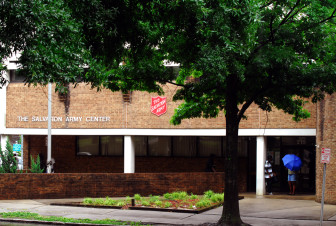
Karen Tam / Raleigh Public Record
The Salvation Army building sits across from Moore Square and is in constant use. The Salvation Army is moving to a new location on Capitol Boulevard.
This past weekend – when the media furor began – Smith said his group was contacted by the city and told that because they had just taken control of the former Salvation Army building, the group would no longer be able to operate there, either.
They resorted to renting out two spaces in a nearby pay lot, but city police contacted the lot’s owner to ensure Human Beans was allowed to continue.
By the time the owner arrived, Smith said, “all the media in the world” had shown up, and the group was able to finish distributing food.
One Group Not Threatened with Arrests
Roy Schmidt, a Cary resident and member of Hope Community Church, said in the Wednesday meeting that on Saturday, his group met in the old Salvation Army parking lot, but were told to leave by two police officers. His group picked up and moved to another location, where he was told to leave again. Finally, he was able to hand out food at a third location about eight blocks from the Salvation Army.
He said both times he interacted with officers he was never threatened with arrest, just asked to leave the property.
Schmidt said everyone keeps asking why there was a crackdown this weekend.
“We don’t care why,” he told the Record after he spoke in front of committee members.
He said he believes the groups will collaborate and find a way to continue feeding the homeless.
Unintended Consequences
Upon learning of the police intervention, Mayor Nancy McFarlane and members of the City Council denied any role in the decision to threaten arrest. Yet businesses and residents located around the park said the weekend feedings have been an issue for years, bringing in a larger population of aggressive panhandlers and leaving behind food wrappings and other litter.
Both Human Beans and Love Wins said they make every effort they can to clean up once the food runs out.
Parker Kennedy, the owner of Caffe Luna, an upscale restaurant located at the intersection of Hargett and Blount streets across from Moore Square, said Tuesday that he believes the groups handing out food are doing “the Lord’s work,” and paraphrased Matthew 25:35, “For I was hungry and you gave me food, I was thirsty and you gave me drink.”
Unfortunately, Kennedy said, the large crowds drawn to the park sometimes make it difficult for local businesses such as his to serve their clientele of young families, a group also catered to by his neighbors at the Marbles Kids Museum across the street.
“It’s a simple problem, easily solved with a little bit of compromise,” he added.
Kennedy said there are a number of quieter, less-trafficked areas in the city that may be better suited to what he admiringly described as the volunteers’ noble cause.
Steve Busi, 38, has owned a property in Founders Row on East Davie Street since 2001, and said the crowds drawn in on the weekends often make it difficult for local residents to move freely about the area.
“There are some safety issues, some of the homeless are quite unstable,” Busi said. “Essentially if you say that Moore Square is the homeless park, that’s something we have to deal with day in day out, especially on the weekends.”
Busi said while there is a homeless population that resides in the area during the week, the crowds tend to swell on the weekends.
“We’re absorbing a lot of a lot of the homeless from various parts of the city,” Busi said, adding that his friends who work in the local bars and restaurants find it difficult to do their jobs when, “there’s a guy waiting to accost your customers.”
Busi acknowledged the issue of how to best help the less fortunate is a touchy subject, although he feels a better balance can be struck than the one existing in the current status quo.
“You can’t say no to that kind of thing, but we can’t be the homeless services neighborhood for the City of Raleigh either,” he added.
Busi said one upside to the recent fracas was that groups on all sides of the issue — the homeless, the working poor, the charities, the businesses, the local residents — have started talking to each other and finding ways to continue helping those in need while also addressing some of the unintended consequences such help can bring to the area.
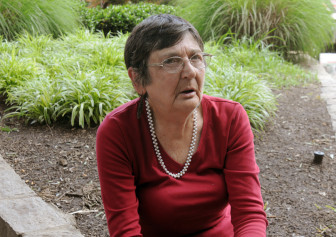
Karen Tam / Raleigh Public Record
Joyce Johnson talks about the problems of the homeless as she sits in Moore Square.
“From that kind of start, things can start moving forward,” he said.
Help, Five Days a Week
Not far from the offices of Love Wins Ministries and only a few blocks from Moore Square, the Shepherd’s Table Soup Kitchen was operating at full capacity this past Tuesday. In just an hour, the kitchen had served about 345 people.
Tamra Gregg, the executive director of the organization, stressed that their clientele extended well beyond the homeless and the destitute: city and state employees, along with construction workers and senior citizens who are all struggling to make ends meet will often come in for a hearty lunch, served 11 a.m. to noon Monday through Friday.
The menu on Tuesday offered everything from chicken wings to vegetables, tossed salad, bologna sandwiches, desert, biscuits, mashed potatoes and, of course, soup.
“We serve our meals in the hope that, if this is their only meal for day — and for majority it is — then they’re sustained,” Gregg said.
Although she found the weekend incident at Moore Square disheartening, Gregg said there have been few silver linings: a man called in offering to donate 80 pounds of barbeque, a local coffee shop offered to provide as much coffee as Good Shepherd could take, and an increased number of people have offered to donate their time serving food.
The weekend feedings are absolutely necessary, she said, because there are almost no other resources available on the weekends, a problem exacerbated by the state’s recent cuts to unemployment funding and glitches with FAST, the new food stamp distribution program.
If the city is unable to come to a solution, she said, “We may have to look at opening on the weekends.”
To do so would require more staff, and an increase in the privately funded nonprofit’s annual budget of $390,000.
Although much of the food is donated and while volunteers are able to do a portion of the work, the organization still has to purchase paper goods, pay rent — a discounted rate of $100 per day from the Good Shepherd church, which allows them use of an industrial kitchen and a common dining space — and manage other expenses.
The cost per individual served ranges around $3.20, and, with an average of more than 300 people per day, five days a week, the numbers add up quickly.
“I know we can find a solution, we just need to talk,” Gregg said, adding that a lack of communication may have added to what she described as the overzealous police action taken over the weekend.
A Retired Officer
Steve Wisniewski, a retired 30-year veteran of the Raleigh Police Department who works the door at Good Shepherd seven days a month, including this past Tuesday, said the decision to crack down on the Moore Square charities was not simply the actions of a few rogue officers.
“The decision to put those guys out there is made way up, I’d tell you for all the tea in China, whoever went out there that day was out there on orders,”he said.
His interpretation of the type of orders handed down to the officers, however, diverged slightly from the explanation given at the Wednesday meeting by Deck-Brown.
“I can promise you this: none of the enforcing officers went down there on their own and jumped out and said they’re going to enforce this. They’ve been watching it happen for years,” he said.
He added that, to his knowledge, this was a decision long in the making. Officers had been photographing the amount of litter left behind on the weekends, as well as attempting to reach out to the charitable groups to work toward a solution, with little success.
“Some of those places were told, you know this is in violation, we’re going to give you a few weeks to find a different way, and some of those folks decided they were going to test the waters,” Wisniewski said, which likely led to the threats of arrest.
After the Wednesday meeting, Deck-Brown emphasized that the orders given had been to educate, not to arrest or even issue citations; indeed, there were no arrests made or citations issued over the ordinance violation this past or any other weekend.
When asked why the Human Beans group had been threatened with arrest a week prior to the events of this past weekend, Deck-Brown said because she wasn’t there, she couldn’t be sure exactly what happened.
“I’m just really looking forward to getting this resolved,” she said.
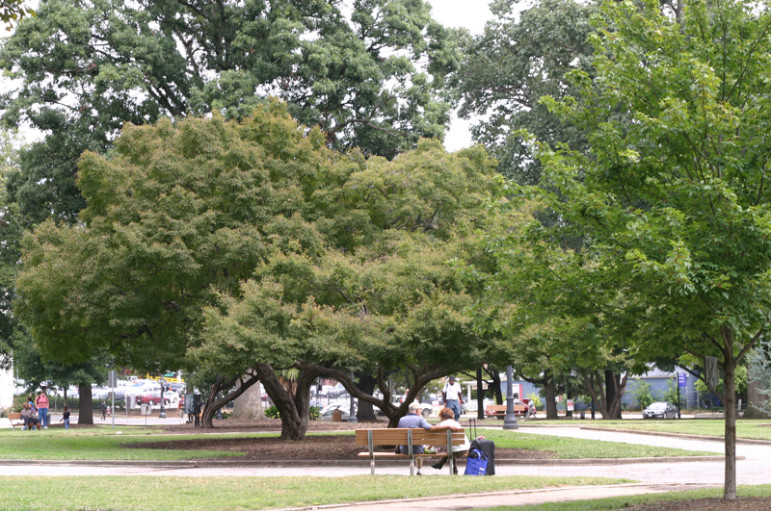
John Wall
A Temporary Resolution
Following the period of public comment Wednesday evening, Assistant City Manager Daniel Howe said city staff doesn’t recommend changing the law, but as a long-term solution is discussed, the ordinance would stand; however, citations will not be issued and arrests will not be made.
Also, groups who want to distribute food would be able to get a permit at no cost instead of the $800 fee.
Howe said that having groups congregate on city property poses a liability. If someone were to get hurt, he said, it could result in a lawsuit that would be paid for with taxpayer money.
“The liability is a big issue for me,” said Councilor John Odom who left shortly after the public comment.
When private groups rent the park, they are required to get their own liability insurance, taking the risk away from the city.
Councilor Randy Stagner said he agreed with the recommendation but said it needs work, especially in regard to the permitting process.
Councilor Mary-Ann Baldwin, chair of the Law and Public Safety Committee, ended the meeting with a motion to approve Howe’s suggestions, and expressed her gratitude to the citizens who had turned out.
“I want to thank everybody for your concern, for your passion, and I want to thank you for being so kind and patient to each other during this process.”
Ariella Monti contributed reporting for this story.
